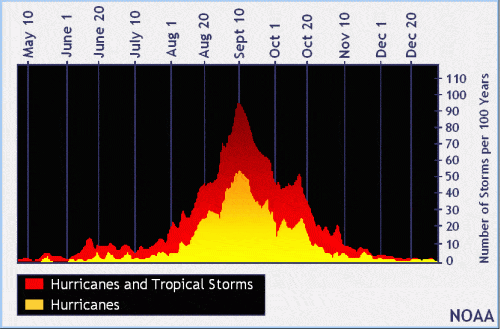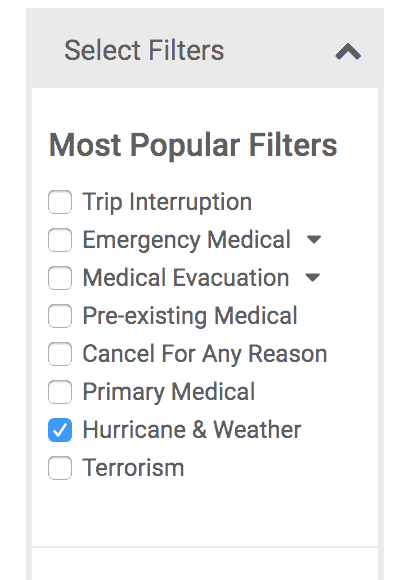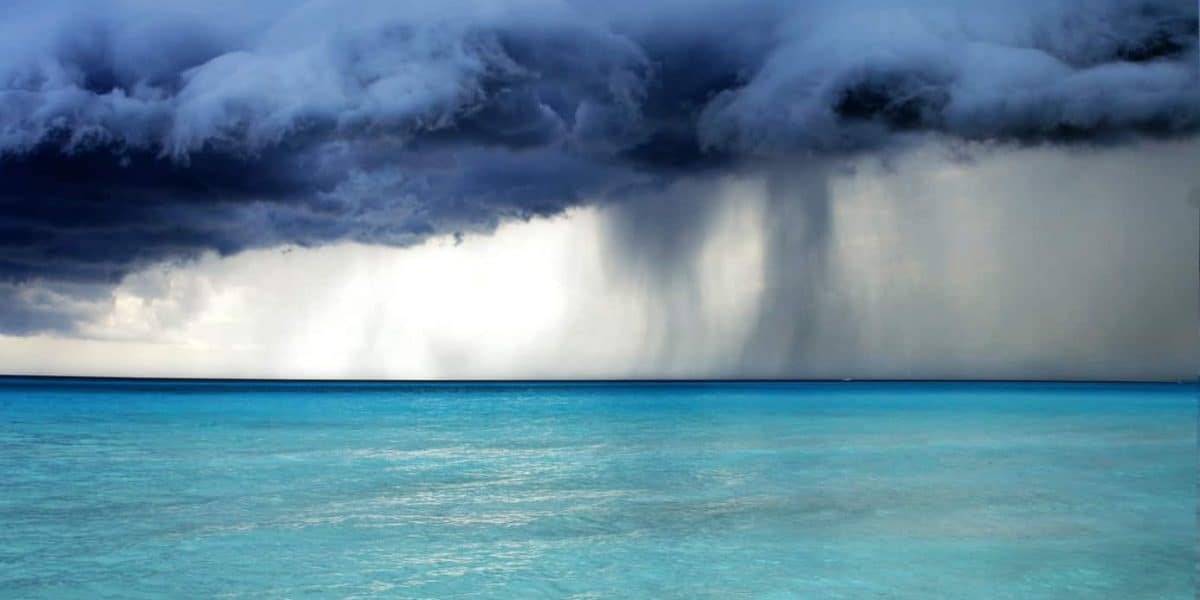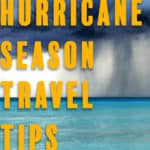When I think of summer vacation I immediately think of a beach vacay: lounging around in the sun, tropical drink in hand, listening to the waves crashing on the shoreline while I read my favorite book. Relaxing in paradise may sound perfect, but more likely than not, your beach vacay is planned for hurricane season.
Hurricane season spans from June 1st until November 30th. In case you don’t care to do the math, that’s 6 months. Hurricane season is literally half of the year. Major hurricane activity really only happens from late August until early October, however.

I’m originally from Colorado and I’ll be the first to admit that I knew approximately nothing about hurricanes before moving to Houston. I figured hurricanes were somewhat rare (Katrina had to be an anomaly, right?) and occur for just a month or so a year. Well, literally 6 weeks after arriving in Houston, I had to learn because Hurricane Harvey was headed our way. It made landfall on August 25th, 2017 as a Cat-4 storm. Categories are based on wind speed and Cat-5 is the most severe classification of a hurricane.
Shortly thereafter Hurricane Irma pummeled Florida, making landfall as a Cat-5 on September 10th, 2017. And here we are, Labor Day 2019, just on the heels of Dorian battering the Bahamas. Up until yesterday, Dorian looked ready to pummel Florida, Georgia, and the Carolinas but her path may be changing, sparing those coastal states from the worst.
What this all mean for you, fellow traveler?
Well, hurricanes are powerful, scary, unpredictable… and like to appear during summer vacation or the long Labor Day weekend. If you’re traveling to the Caribbean or anywhere else along the Gulf or Atlantic coast, a hurricane may be possible.
Fear not, fellow traveler: here is a compilation of travel tips to keep in mind during hurricane season.
Please note: I do include some affiliate links below. What that means is, if you make a purchase through one of these links, I may make a commission at no additional cost to you!
Don’t worry too much about hurricanes – they aren’t super common
From the graphic above, it’s pretty easy to tell that hurricanes are not a super common occurrence. According to the United States Search & Rescue Task Force, 10 tropical storms form per year on average, 5 of which become hurricanes. Most of these storms will just hang out over the ocean.
So what’s the point?
Traveling during hurricane season isn’t all that risky. The chance that a hurricane will form over your exact dates and hit your exact location is quite low. So don’t plan around hurricane season, just be aware of it.
Be prepared and get travel insurance ASAP
No, hurricanes aren’t all that common, but you should still be prepared.
Your first defense (financially, at least) is travel insurance. Travel insurance isn’t too expensive and can compensate you for airline delays, lost luggage, AD&D, terrorism, injury, medical issues, and so much more.
I use Squaremouth for my travel insurance needs and I’ve always had a good experience. I find the prices to be fair and the shopping tool is so easy. You’re able to easily filter down coverage you’d like, compare policies, and buy one immediately.
I actually made a claim once when Lufthansa had a huge strike in November 2015! Getting my expenses reimbursed was easy, which is why I’m a repeat customer.
Ok! So selecting your policy. One important thing to note: hurricane coverage tends to be an add-on.
But Squaremouth makes that easy. Simply select “Hurricane & Weather” on the left sidebar.

A bunch of different options will pop up. You can select the ones that look initially most appealing and compare them against each other. Always read the fine print! You may find that one policy covers something that is more important to you than another policy.


Don’t dilly-dally on buying coverage. It’s usually only valid if it’s purchased before a storm is named. I buy travel insurance every single time I travel! It’s cheap peace of mind. There is no reason to delay purchasing coverage.
Watch the National Hurricane Center (NHC) in the days leading up to your trip
Your trip is booked, your travel insurance is bought (… right?), and now you’re in the final days before departure.
If you’re traveling to the tropics or to a coastal city, it is very important that you check for storm development shortly before leaving. This will provide some insight on upcoming risks that you may be aware of.
Dorian, for example, was brewing for at least a week before making landfall. It became clear pretty quickly that Dorian was going to be a monster storm which gives travelers plenty of time (and opportunity!) to modify plans. There is no excuse – inform yourself!
I like to check the National Hurricane Center (NHC) website. Another good source is their Facebook page – you’ll get quick, timely updates just by scrolling through your feed.
If a storm is developing, pay attention to the spaghetti models
So you’ve checked the NHC and you find a storm forming! Now what?!
Check out the spaghetti models. Spaghetti models show the potential path of a storm based on multiple computer models. You’ll often find that most of the spaghetti models generally agree except for a few outliers. This will help give you an idea of the “most likely” path of the storm. If you’re traveling somewhere and only one model predicts your locale will be impacted, you probably have no reason to worry. If most the models predict you’ll be impacted, however, you should probably be concerned.
This is my favorite resource for finding all current spaghetti models.
If a hurricane is imminent, look into canceling or changing your travel plans
Your vacation is not more important than your life.
Look at the Bahamas this past week: Dorian absolutely ravaged the island. People died. Structures were destroyed. Who even knows what the state of medical care is, let alone access to fresh food and water.
There were signs that Dorian was headed this way. As a traveler, you have a choice to avoid the situation. If you have the opportunity, take it.
The hurricane may follow the path or it may change. If you cancel your plans and the path changes, don’t kick yourself: it was still a good decision. Don’t blindly proceed with your travel plans in the hopes that the path may change – you may be putting your life (along with your loved one’s lives) in jeopardy.
If a storm develops while traveling, track it closely and proactively look for a way out
Maybe you’ve done everything right. You read these travel tips for hurricane season. You’ve tracked the tropics, you’ve purchased travel insurance, and no storms popped up before leaving. But, lo and behold, one starts developing once you begin your vacay.
Storms progress slowly so you probably don’t have to worry. Regardless, track the storm. Watch the spaghetti models and the NHC cone of uncertainty. If it looks like a storm may make landfall around or before your departure time, proactively look for a way out.
You don’t want to be competing against hundreds or thousands of other travelers with a hurricane bearing down on you.
If you can’t escape, make smart decisions!
If you’re stuck somewhere with a hurricane bearing down on you, start prepping and making smart decisions immediately.
- Try and move inland. Being near the coast put you at risk of storm surge which can be devastating to life and property. Moving away from the coast will make you immediately safer.
- Get high up, but have an escape route. You don’t want to be trapped in an attic with no escape path as floodwaters rise.
- After finding a place to hunker down, stay. There is no need to travel during a hurricane.
- Cash is king! If your destination loses electricity, credit cards won’t work. You’ll need cash for any transaction. Seek out cash as soon as you realize you’re going to be trapped.
- Buy water and other non-perishables. You don’t want to rely on an all-inclusive resort during a natural disaster for sustenance. Bottled water, peanut butter, jerky, and other calorie-dense foods are always a good bet.
- It may be worth purchasing a small medical grab bag. Bandages, pain medication, and antibiotic ointments are a good start.
- Have a communication plan with both your fellow travelers and your friends & family back home. Establish a communication frequency and a rendezvous point in the event you’re separated.
I think it’s worthwhile to travel with some other items, just in case.
My first choice is an external battery pack. This one can hold multiple phone charges and can be used to prolong communications.
My second choice is a Life Straw. A Life Straw filters water and could literally save your life in the event of an emergency or natural disaster. I have a few in my home hurricane preparedness kit but plan to travel with one going forward. It’s small, so why not?
Although the risk of your travels being impacted by a hurricane is slim, the impacts can be huge. With these travel tips, you can better prepare for hurricane season and help ensure that you and your loved ones are safe.
Do you have any other advice to add? Comment below!



